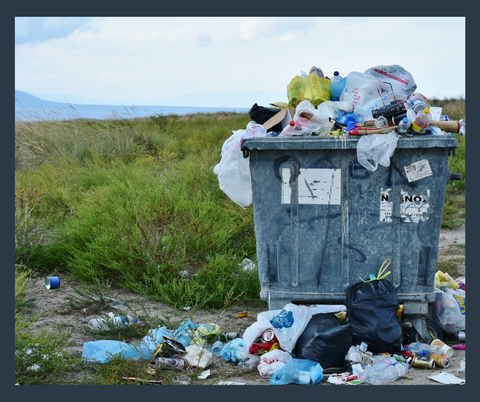
It's true here and it's true elsewhere.
In Quebec, residual materials represent 13 million tonnes per year. The global global average is 1.2 kilos per person per day! The Canadian average is 720 kilos per year per capita with the province of Alberta at the top of the list. Several Canadian provinces have implemented measures to reduce these quantities.
The province of Quebec adopted a Quebec Residual Materials Management Policy in 1998 . However, according to Recyc-Québec , the objectives of this policy have not been met. On the contrary, the objective of 525 kg/inhabitant established for 2023 in the Quebec government action plan seems utopian, the most recent data (2019) se encrypt to 724 kilograms of waste per capita, the highest quantity since 2011.
The Quebec government seems to aim for a society without waste through sound management of its residual materials and by seeking to maximize the added value of each potential waste.
The ultimate goal is that the only residual material, the only waste, eliminated in Quebec is the ultimate residue.
In short... we need more concrete, to actively participate.

My role as a citizen
But how can we, as citizens, help achieve this goal? How can I reduce the amount of waste or residual materials I produce?
To facilitate our actions and decision-making, we can use the concept of the 5R-C (formerly the enhanced 3R-V).
These must be understood as a continuum, an ordered way of managing our consumption. It is a strategy aimed at a waste-free lifestyle that is part of a more eco-responsible life.
The 5R-Cs address in order: reducing consumption, reusing goods, recycling and recovery or composting.
To fully understand each of the ideas generating this overall concept, we define them and give you concrete examples.

REDUCE (REFUSE)
The least damaging waste is that which does not exist.
Before buying a property, the very first questions to ask yourself are: Is the desired property necessary? What need does it fill? Is the desired good of quality, does it have a good lifespan?
Another question to ask particularly when it comes to an object allowing a single use: is there an alternative solution which would allow me to use an object several times for the same use (eg: use washable food covers instead of disposable food wraps).
Examples: avoid overpackaging, disposable coffee cups, non-organic vegetables/fruits that have been subjected to unnecessary pesticides, reduce meat consumption, reduce vehicle use, etc.
REUSE (REEMPLOY) and REVALORIZE
Reuse means extending the life of an item without undergoing any major transformation. Reusing also means repairing, exchanging and buying used.
Examples: giving a good or item of clothing directly to a person who will use it, participating in clothing exchanges, repairing clothing yourself or with the help of a seamstress that requires a little adjustment or repair, consult online sales platforms or go to garage sales for second-hand items.
TO RECYCLE
It involves recovering goods from which materials are extracted to create new goods. It is an interesting waste management which occupies 3rd place, after reduction and reuse.
Examples: use your recycling bin or public recycling bins properly when you go out, transform clothes that have become unusable into rags, donate some of your clothes and belongings that are reaching the end of their life to organizations or artisans collectors.
Sites like Pinterest are full of recycling ideas you can do at home.

COMPOST (VALORIZE)
We can recycle waste which can generate materials or energy. It's about making a profit from what seemed useless. Valorization comes in last position in the 5R-C hierarchy. It is only desirable when we have reduced at source, reused or recycled our residual materials
Examples: compost at home or using your municipality’s facilities. In the industrial sector, the use of used tires or wood residue as a source of energy production is also considered recovery.
You may be wondering if you can tell the difference?
Well, definitely! If every citizen of Quebec, Canada and the world applied this simple principle, the difference would be more than striking!
When we act collectively, the results become observable and significant. We have seen that Quebecers are capable of reducing the quantity of waste they generate. Beaconsfield has implemented a system that charges citizens based on the amount of waste they generate and they have seen a 26% reduction in the municipality's total garbage.
Should we wait to pay or be taxed before changing our consumption patterns by choosing better? Should we wait until we are truly invaded by garbage and no longer have access to raw resources? Of course not !
Our blog is full of tips and tricks for making a great transition to a zero waste, more eco-responsible lifestyle. In addition, to eliminate single-use items, we have done a lot of research to be able to integrate quality products into our store .

Ecologically yours,



0 comments